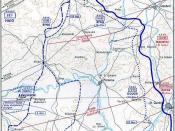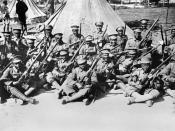To most, the Somme Offensive was one of the biggest failures of World War I. By discussing the purposes, leadership, conditions, morale and events of the Somme Offensive we can determine to what degree it was a failure. Each of these individual factors is essential in deciding to what extent it was a failure. The purposes for beginning the Somme Offensive and the ineffective leadership that made the decisions are both critical factors effecting the extent to which it was a failure. The appalling conditions and low morale had a significant impact on the Allied chances of success and major events, such as individual battles, were also important factors that affected the Allied chances of winning the Somme Offensive. In the ensuing discussion, it will be obvious to what extent the Somme Offensive was a failure.
The purposes for beginning the Somme Offensive are vital in determining to what extent it was a failure.
Haig and Joffre's original intention at the Somme was to relieve the pressure on Verdun and to break through the German lines to decisively change the war from stalemate to movement. Within the first few weeks they realise that this is not possible and turn to a war of attrition. Laffin, a well-respected World War I historian, states that Haig could not call off the offensive because it "would be an open admission of failure." This is truthful in that it would be a personal failure, but it would also be a national failure and a strategic blow that would lower morale and the Allies chances of winning the war. Because of the nature of attrition warfare, the Germans soon learnt to minimise their casualties, as General Sixt von Armin explained after the war. "One of the most important lessons drawn from the Battle of...


